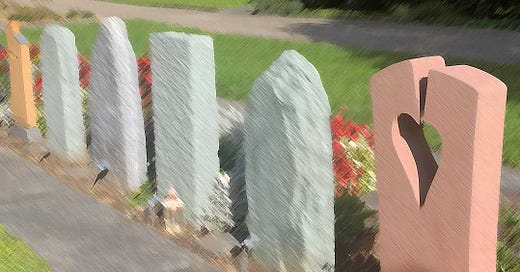Welcome back! (Or welcome!)
Life is complicated. (And so is death).
This is a newsletter with stories and tools to help you be more comfortable as you help others in hard times. Sometimes, like today, I draw on my work as a hospital chaplain.
Excessive death
I’ve had several conversations at bedside in the last few months that were something like this: “A year ago, his mom died after being sick for a long time. And then my sister died. And then my mom died. And then there was a fire. And now this.”
There are variations, of course. “My dad and then my husband. And in between, my dog.”
But the common thread is several traumatic events, including multiple deaths, in the last year or two.
This may be nothing new. As we think through eras in history, and we think through times of war and famine, individuals facing multiple losses happens.
On the other hand, although there isn’t a war in the US at the moment, during the last three years, the death rate, which is the number of deaths per thousand has gone from 8.6 (2018) to 10.25 (2020) and 10.14 (2022). In numbers of people, the recorded deaths is 3,389,088 people who died in 2022.
This increase isn’t just about COVID, though that is a significant cause of death. Regardless of the reason, the numbers of people dying has gone up, and the number of families facing multiple losses feels like it is going up. Further, when many people die in a single event, the national statistics don’t matter. The local trauma does.
For these individuals and these families, the accumulating grief and disruption is significant.
Any one of those deaths creates confusion. All of them together shakes routines and habits and stories and foundations. For example, when the person you always turn to for strength dies, and then another family member dies, you don’t have your person that helps you survive.
So how can we be helpful?
We can listen for clues or stories of multiple deaths. If we only interact with these people about ONE of these events, and we don’t listen to hear about ALL the events, we will miss the burden they are carrying. (And, when I hear information like this, I let the other hospital staff know, to give them context.)
We can leave more time than usual for answers to simple questions. This isn’t just about the usual thinking challenges that follow a death. When there have been multiple losses, the person may have to figure out layers of decisions. “My husband knew that, my mom knew that other thing, my sister handled those things, and now all of them are gone and I have to figure out ALL the answers.” So what seems simple, isn’t.
We can feel free to NOT answer for God. Sometimes these conversations include questions around this one: “Why is God doing this to us?” I understand the question. And most of the time, there isn’t a helpful or clarifying answer to this question at the time it’s being asked. And often, it’s a declaration more than a question. “I don’t know” and “It’s a lot” and a hug are some of the most helpful responses in the moment.
We can put things in writing as well as saying them out loud. Resources, words of affection, phone numbers for contractors and counselors and cotton candy suppliers, directions for using the battery-powered mower.
In case you missed this handout, here are Thirty-one things to say and do to help someone when their loved one has died (other than sending flowers.)
We can answer with, “That’s a lot.”
We can be more kind than usual.
We can be aware that whole family networks are shaken, and will have all the painful parts of grief bouncing through them. (There’s not an answer for this, of course. But it’s worth being aware of when we think, “Why is everyone so cranky?”
When we wonder why everyone is on edge around us, and we are tempted to blame weather and social media and religion, it’s worth including grief as well. As I often say, “some things get easier with practice. Not the deaths of loved ones.”
+++
Thanks for reading and subscribing.
Today, I was at a workshop my friend Patrick Riecke was leading about “Navigating Death & Grief in Congregations.” As he gave principles and examples, people shared their own stories, often with tears. It was a reminder that when people are learning how to help others, they are often bringing their own sense of loss. They want to help because they remember the hurt.
I know that’s true here, too, among the readers of this newsletter. When I talk about loss and being helpful, I’m always grateful that you bring your own stories that are often close to the surface. Thanks for taking the risk to be here. Thanks for wanting to help others.
See you next week.
Jon (and Nancy)
Buy me a coffee to support this research and writing.







Well stated. Thank you for sharing from your experience.
And I think we need to consider non-death griefs as well. In the span of a couple of weeks this month, my closest local friend died and I also had to leave my job due to growing toxicity in the work environment. The ways that these two griefs (which simply represent two from this month) are tangling together are exhausting and overwhelming - as they both come with secondary losses as well. Just a reminder to be kind and grace-giving - so often we don't know the whole story.